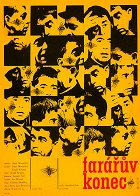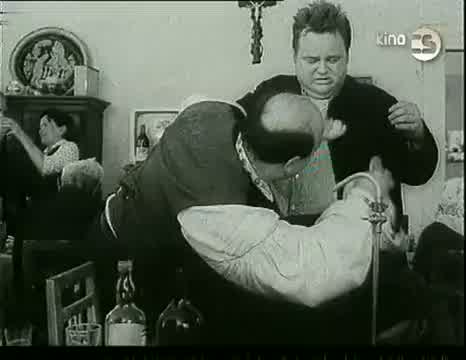Reżyseria:
Evald SchormZdjęcia:
Jaromír ŠofrMuzyka:
Jan KlusákObsada:
Vlastimil Brodský, Jan Libíček, Jana Brejchová, Zdena Salivarová-Škvorecká, Jaroslav Satoranský, Vladimír Valenta, Helena Růžičková (więcej)Opisy(1)
Scenariusz powstał we współpracy z pisarzem Josefem Škvoreckým na podstawie artykułu prasowego o oszuście działającym na wsi we wschodnich Czechach, który podawał się za księdza. Fałszywy kapłan, początkowo przyjmowany przez parafię z entuzjazmem, staje się solą w oku nauczyciela, który podporządkowywał sobie lokalną społeczność skuteczną demagogią. (Kino na hranici)
(więcej)Recenzje (3)
The film is an adorable tale with a somewhat dull satirical edge and not entirely consistent metaphors. Sometimes, it is quite entertaining, but the simultaneous portrait of idolatry and "partisanship" gets lost somewhat, and in the end only a very friendly village atmosphere and a truly excellent "sixties" group of actors remain. Otherwise, when compared to the top films of the period, it is truly tame and does not cause conflict.
()
I had considered The End of a Priest one of the most impressive films of Czechoslovak cinema of the 1960s. However, repeated viewing years later did not confirm my exceptional experience. From Schorm's film emerged only a solid, mediocre piece, which elevates the presence of two great actors - Vlastimil Brodský and Jan Libíček. Libíček excels in the role of a rural teacher and mayor. It is one of the most rewarding characters of his prematurely ended yet intense and successful acting career. His character of careerist, manipulator, and intriguer represents the face of state power, which the actor systematically parodies, ironizes, and mocks ideological clichés, phrases, and hypocrisy. His counterpart represents a sympathetic church custodian who, rather out of misunderstanding than ill intent, accepts the position of a priest in a village he passes through. The new role, secretly desiring it, gradually engulfs him, and the fake priest becomes a moral authority and counterbalance to secular power. This starting point is very interesting, but due to the potential remaining untapped, it falls short of what it deserves. The film is highly inconsistent - on the one hand, it aims for a relaxed comedy from the Czech countryside in a more refined style, characterized by characters like a stubborn hypochondriac grandmother. On the other hand, allegorical motifs appear in scenes with a traveling theater and strange supervisors-advisors, which would be more suited for intellectual reflection for a demanding viewer. Add to that the tragic ending, which clashes with the pleasant comedic atmosphere, and the result is a film that doesn't know what it wants to be. Overall impression: 65%.
()
Vlastimil Brodský and Jan Libíček excel in a somewhat cynical parable set in an indeterminate time and place, but with a very definite message. Who is fake and who is real? Who's faking what and why? Who should we trust and who should we watch out for? Forty-seven years ago it was as hard to tell as it is today. "Man is basically evil..."
()

